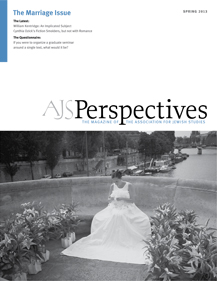Dear Colleagues,
Membership dues play a critical role in supporting the work of the Association for Jewish Studies, accounting for roughly a third of the organization's annual budget. These dues help pay for core programs, such as Perspectives, AJS Review, the Distinguished Lectureship Program, the extensive resources on the AJS website, and all the staff time associated with these projects. And, of course, the dues help keep the lights on. Despite rising annual costs for these programs and overall operations, AJS has maintained the same dues levels for the past half decade, carefully managing its income and expenses to eke out as many enhanced services within its current structure.
Looking ahead to the next several years, however, the AJS Board of Directors felt it appropriate and necessary to change the dues structure—both to simplify a complicated, multitiered, income-based system and to create a sustainable model that can support AJS's services while remaining sensitive to members' financial situations. This change, recommended by Vice-President for Membership Anita Norich and the Executive Committee and then approved by the AJS Board of Directors at its June and December 2012 meetings, came out of a careful, year-long study of other learned societies' dues structures. Particular attention was paid to different membership models (flat fee vs. incomebased), ranges of services offered, current and projected salary levels of members, and organizational infrastructure (i.e., volunteer vs. professional staff). Full details of the new structure to be implemented for the 2013–14 membership year can be found at www.ajsnet.org/ membership.htm. Here are the highlights: (1) The board retained an income-based dues structure but reduced the number of income tiers from twelve to eight. (2) Where previously the highest income level was "above $125,000," there is now a new level of "above $150,000." (3) AJS continues to subsidize memberships at the lower range of the income scale, as an investment in the future of these scholars; thus, student rates will remain the same, and others earning less than $30,000 annually will see only a $5 dues increase. (4) For more than 75 percent of non-student members, the average dues increase will be less than $8.
The board also approved a second, important change: revising the membership categories that have been in place since AJS's incorporation in 1970. This may seem simply like a bureaucratic adjustment, but it reflects important developments in the field. For decades, the Association had three main types of memberships: Regular Members, "for individuals whose full time vocation is devoted to either teaching, research or related academic endeavors in Jewish studies"; Associate Members, "for individuals who share the intellectual concerns related to the purposes of the Corporation, but whose major vocation is not in academic Jewish studies"; and Student Members, i.e., graduate students concentrating in an area of Jewish Studies. A bit of institutional history helps to explain this change in membership categories. While the number of Regular and Student Members grew in popularity over the years, the number of Associate Members dwindled. When AJS was founded, there was a constituency of people who, though not professors or otherwise professionally engaged in academic Jewish Studies, had a deep scholarly interest in the field and saw AJS as an intellectual home. At a time when Jewish Studies was seeking credibility on college and university campuses as an academic discipline, the Association's leadership felt it necessary to distinguish scholars trained in the academy (Regular Members) from those without such training (Associate Members). Over the years, the legitimacy of Jewish Studies as an academic discipline and of its practitioners as trained scholars has become widely accepted; as a consequence, this distinction in membership categories has become irrelevant. Therefore, the Board of Directors has amended the by-laws by eliminating separate Regular and Associate categories and creating a new category, the Professional Member, which encompasses "anyone with a professional or scholarly interest in Jewish Studies." "'Professional interest,'" the by-laws now read, "refers to someone whose part- or full-time vocation is devoted either to teaching, research, or related academic endeavors in Jewish Studies. 'Scholarly interest' refers to someone who shares the intellectual interests of the Organization, but whose major vocation is not in Jewish Studies."
AJS is grateful for the extraordinary support its members have shown the organization over the past several years, especially during trying financial times at most colleges and universities. We constantly seek to provide new services and benefits to our members, and support them in their work as scholars and teachers. As you renew your membership and review these changes, please do not hesitate to contact me (rsheramy@ajs.cjh.org) or Vice-President for Membership Anita Norich (norich@umich.edu) with any comments, questions, or concerns.
Rona Sheramy
Association for Jewish Studies

